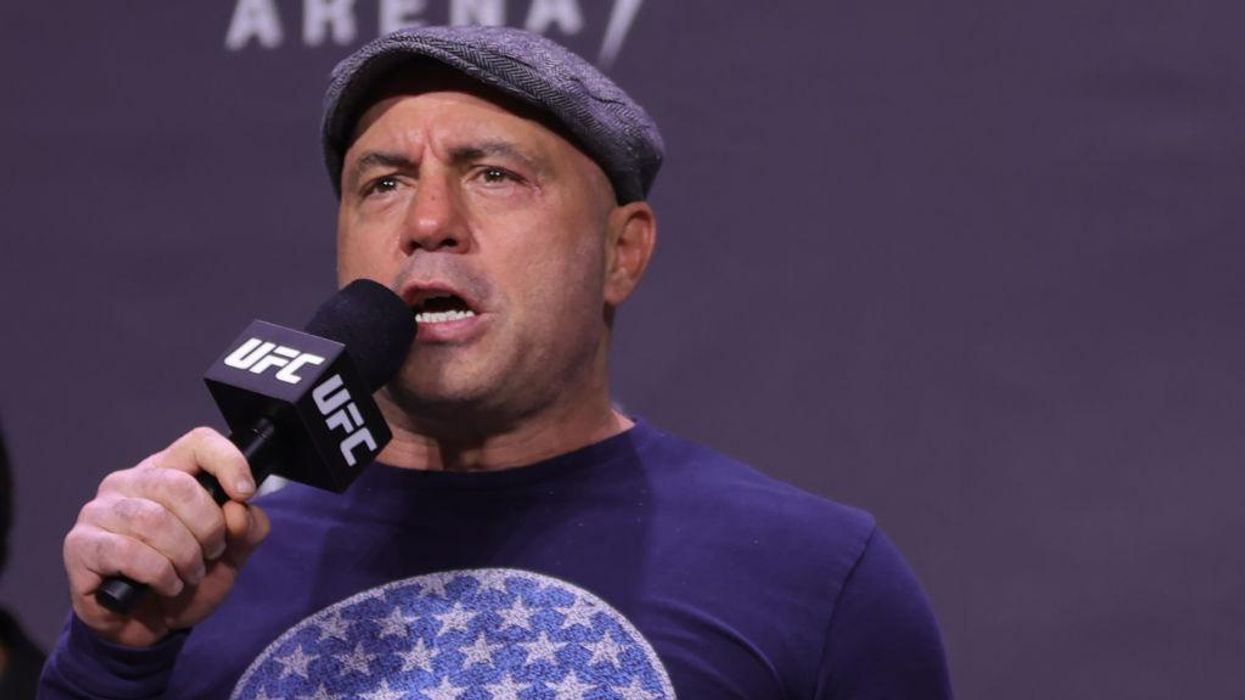
Carmen Mandato/Getty Images

In a recent podcast episode, Joe Rogan welcomed Daryl Davis — a black musician and author who has been befriending members of the Ku Klux Klan and neo-Nazis in an effort to persuade them not to hate people because of their skin color. Davis said he had convinced more than 200 Klansmen to turn in their robes to him.
Also appearing in "The Joe Rogan Experience" episode was Bill Ottman – internet entrepreneur, free speech activist, and CEO of the blockchain-based social media network Minds.
Davis and Ottman are both involved in the "Change Minds Initiative," which argues that de-platforming people from social media only radicalizes people more. The Change Minds Initiative will attempt to "facilitate engagement, free expression, communication, and active input from parties who promote non-violence, critical thinking, creativity, and empathetic engagement."
Davis and Ottman were two of the six authors who penned a paper on the effect of censorship and how "deplatforming actually intensifies extremism."
"The research found significant evidence that censorship and deplatforming can promote and amplify, rather than suppress, cognitive radicalization and even violent extremism," the paper reads. "Shutting down accounts accused of violating hate-speech policies and misinformation often shifts those banned individuals to alternative platforms where their narrative of long-suffering victimhood is further refined."
"What is deplatforming supposed to achieve? If the goal is to curtail the radicalization to violence there is little evidence to support this conclusion," the paper states.
"The limited empirical evidence that exists on the role that online speech plays in the radicalization-to-violence journey suggests that people are primarily radicalized through experienced disaffection, face-to-face encounters and offline relationships," the authors argue. "Extremist propaganda alone does not turn individuals to violence. Other variables are at play."
"The focus on social media usage as a radicalization vector may be overstated," the paper suggests. "More attention on the role mainstream news coverage through TV and print media may be required."
The paper cited a study from George Washington University in 2019: "The key to understanding the resilience of online hate lies in its global network-of-network dynamics. Interconnected hate clusters form global 'hate highways' that — assisted by collective online adaptations — cross social media platforms, sometimes using 'back doors' even after being banned, as well as jumping between countries, continents, and languages."
Davis writes in the paper, "We increasingly see the authors of controversial views suspended from, kicked off, or put in a platform's 'jail' for expressing opinions. Exiled dissidents may seek alternate and sometimes nefarious platforms. Thus is born a breeding ground for conspiracy theories and plots. It’s an ugly spiraling mess."
In the recent episode of "The Joe Rogan Experience," Ottman expressed, "Even the Left, like outlets like Vox, are now admitting that deplatforming causes more severe radicalization. This is being admitted across the board."
"So the fact that big tech apps are not looking at this data and applying it to their policy, it makes you almost have to speculate that they're intentionally causing it," Ottman suggested. "I mean, because they these are very smart people that work at big tech sites. They know about data science, they know the spread of information."
Rogan disagreed, "I don't think they're intentionally causing it." The prolific podcaster added that he didn't think social media companies were not intentionally trying to radicalize people.
Rogan theorized, "First of all, there's an ideology that is attached to all the big tech companies, whether it's Google or Facebook or Twitter, you have to be what they think is 'woke,' right?"
Rogan said, "You have to subscribe to a certain line of thinking, and anybody that deviates from that line of thinking should be suppressed, minimized or banned."
"The CEOs have to virtue signal," Rogan continued. "All the people that are executives have to virtue signal, and they have to say, 'We're doing our best to stop harmful talk.'"
"But what they call 'harmful' like a lot of it is like disagreeing with pharmaceutical companies, which is just f***ing crazy," he exclaimed, then slammed big pharma executives, "Like these are the lyingest liars that ever lied."
Rogan then picked apart the argument that he is not supposed to platform people with views some people don't like.
"I have people on this podcast all the time that I don't agree with at all or I agree with them very little, and I want to see what's going on in their head," he stated.
Rogan said he doesn't have "bad people" on his Spotify show.
He added that he has people with right-wing and left-wing ideologies on his podcast and doesn't think anyone "should be suppressed."
Ottman interjected, "You cannot change someone's mind if you do not platform them. It is impossible for someone with horrible ideology to change."
Davis commented on people being kicked off social media platforms on the basis of "disinformation." He then brought up the examples of the Renaissance-era astronomer Nicolaus Copernicus being "scorned and ridiculed" for saying that the sun is the center of the solar system and Galileo Galilei being vehemently charged with heresy and put on house arrest for also believing in Copernican heliocentrism.
Rogan brought up the First Amendment and big tech censoring users, "And the idea that you the f***ing tech dorks are going to step in and say, 'No, this is dangerous thinking.'"
Ottman added, "The battle-tested First Amendment, hundreds of years of precedent, legal precedent. Talk about a good content policy."
"They think that their lawyers are better at drafting healthy conversation than the First Amendment," Ottman said on the massively popular podcast. "And that's just not that's not true."
Davis said, "You combat bad information by providing more good information."
Davis stressed, "A missed opportunity for dialogue is a missed opportunity for conflict resolution. It’s as simple as that."